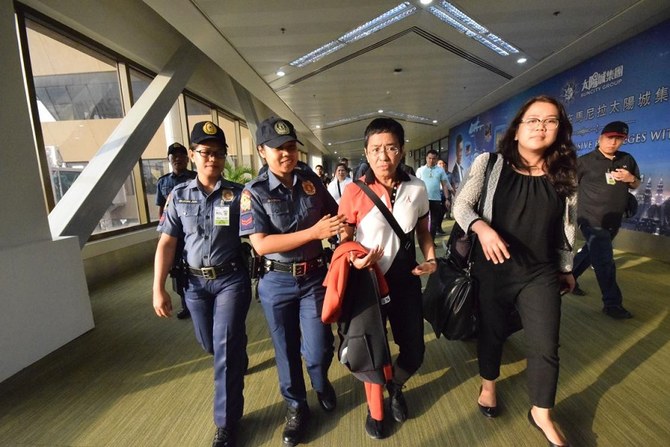MANILA: The head of a Philippine news website known for critical reports about President Rodrigo Duterte was freed on bail hours after she was re-arrested at a Manila airport on Friday on charges she had violated foreign ownership rules.
“You cannot harass and intimidate journalists to silence. We’ll stand up and fight against it,” Maria Ressa, the award-winning head of news platform Rappler, told reporters after posting bail of 90,000 pesos ($1,707).
Lawsuits against news platform Rappler have drawn global concern about a free and open media in the democratic Southeast Asian country.
Rappler and its officials are now facing 11 cases, said Ressa, who posted bail for the seventh time.
Ressa was served an arrest warrant over a libel case live on television last month and spent a night in detention before she was released. She was arrested again on Friday minutes after arriving from the United States.
“It is sad this is the kind of welcome our country gives to journalists,” said Ressa, who is due to be arraigned in a regional court on April 10.
State prosecutors filed the latest charges against her and other Rappler executives on Wednesday, while she was overseas. Philippine National Police Chief Oscar Albayalde said officers were enforcing a court order.
The Philippine constitution bans foreign ownership of media but Rappler has said foreigners who invested in its Philippine Depositary Receipts do not have any say in its operations.
Media watchdogs said the charges against Ressa were trumped up and aimed at intimidating those who challenge Duterte’s rule, in particular his deadly crackdown on illicit drugs.
“The court case is unprecedented and speaks volumes of the Duterte administration’s determination to shut the website down for its credible and consistent reporting on the government, particularly the ‘drug war’ and the extrajudicial killings of drug suspects and civilians,” Human Rights Watch said.
More than 5,000 suspected drug dealers have been killed in police sting operations. Rights group say the police summarily executed suspects, a claim which police deny.
Presidential spokesman Salvador Panelo said the courts and police were acting according to the law in issuing and executing the arrest warrant against Ressa.
“She cannot complain this is a violation of press freedom,” Panelo told a news conference. “Press freedom has nothing to do with the charges against Ms. Ressa.”
The National Union of Journalists of the Philippines said Rappler had become “the whipping boy of the Duterte administration as it seeks to silence or intimidate the independent and critical press.”
Duterte has made no secret of his annoyance at Rappler and has sparred frequently with its reporters, who are known for scrutinizing his policies and appointments and for questioning the accuracy of his sweeping, often bellicose statements.



























